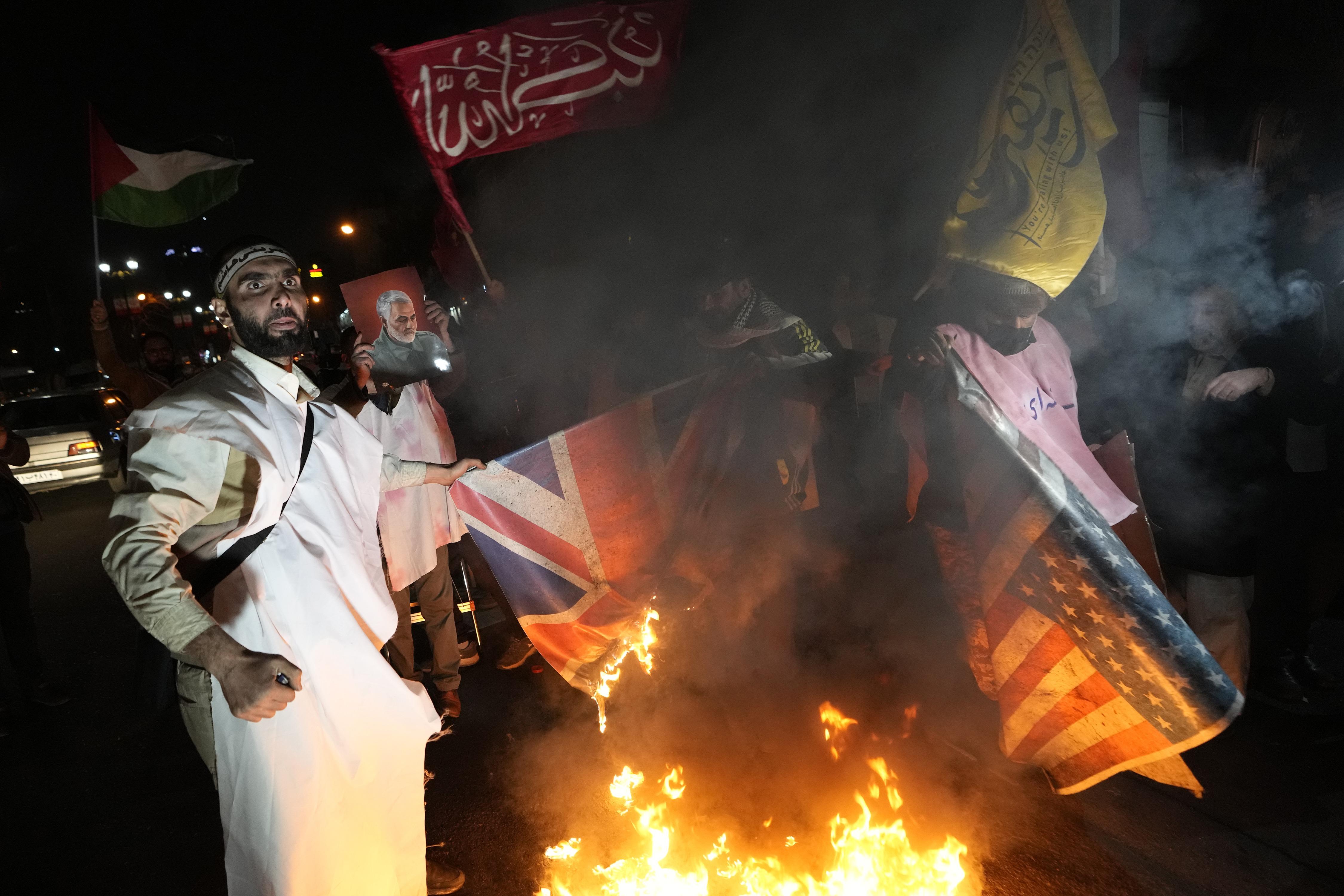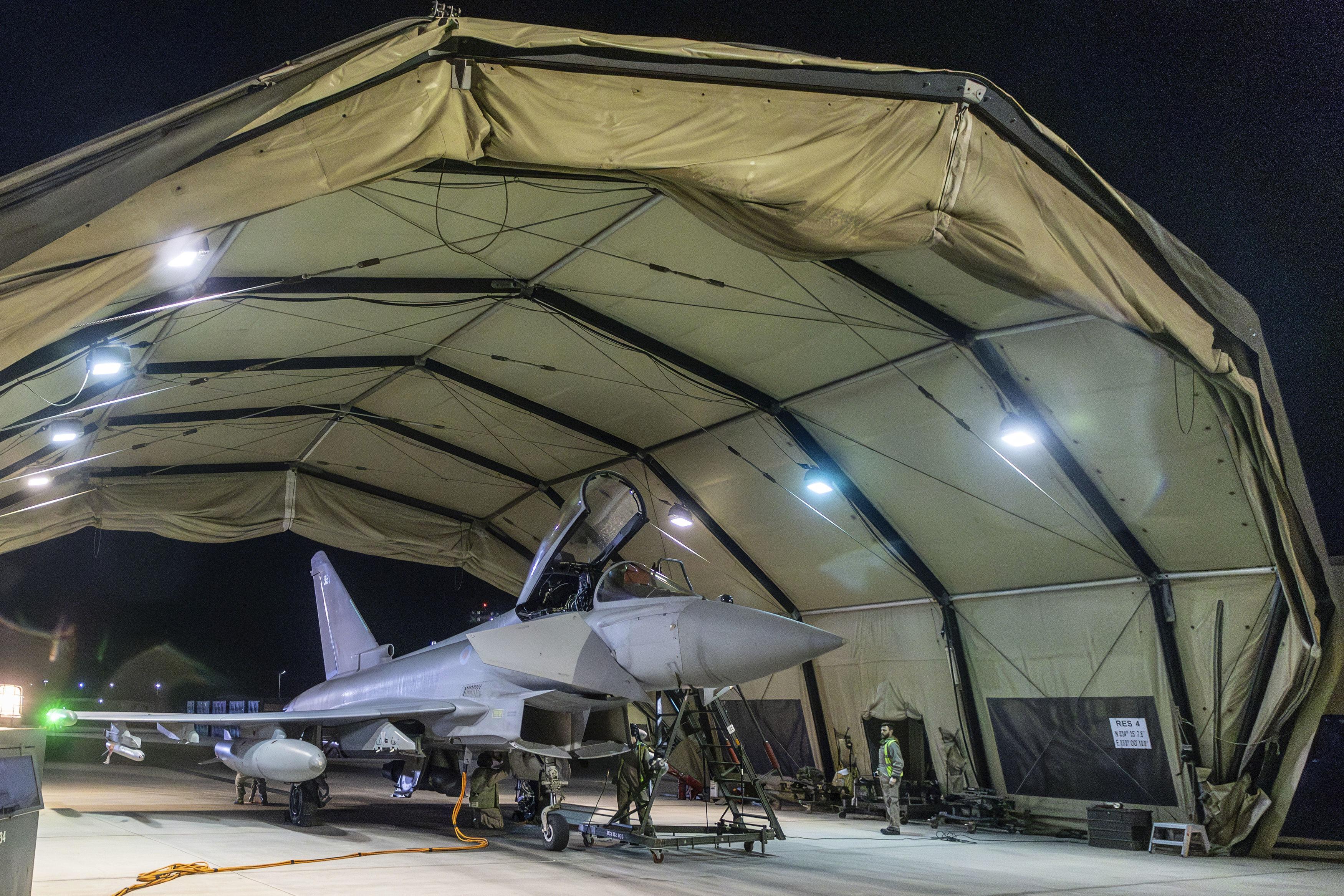 Iranian demonstrators burn representations of British and US flags during a protest against the US and British strikes against Houthis in Yemen, in front of the British Embassy in Tehran, Iran, Jan 12, 2024. (PHOTO / AP)
Iranian demonstrators burn representations of British and US flags during a protest against the US and British strikes against Houthis in Yemen, in front of the British Embassy in Tehran, Iran, Jan 12, 2024. (PHOTO / AP)
The strikes of the United States and the United Kingdom against Yemen’s Houthis violate international laws as well as Yemen’s sovereignty, experts say, adding that they risk sparking a broader regional conflict contrary to international de-escalation efforts.
On Jan 12, the US and UK launched a series of airstrikes targeting Houthi groups in Sanaa, the nation’s capital, and other areas of Yemen.
Houthi military spokesman Yahya Sarea said in a statement on Jan 12 that the strikes killed five people and injured six, while warning that the US and UK aggression will not go unanswered or unpunished, Xinhua News Agency reported.
Abdalfatah Asqool, an international law lecturer at the University of Palestine, told China Daily that although the US was calling not to expand the conflict and the aggression in Gaza in the Israel-Palestine conflict, its actions prove the opposite
Then on Jan 14, the US and Britain conducted a strike on Yemen's Red Sea port city of Hodeidah, the Houthi-run al-Masirah TV reported. The strike targeted the Jad'a mountain in the Alluheyah district in the northern part of the city, the report said.
ALSO READ: Yemen's Houthis ramp up attacks on shipping in Red Sea
These were said to come in response to rebel attacks on commercial ships in the Red Sea, which had prompted shipping companies to re-route, causing delays that could threaten the global supply chain.
Abdalfatah Asqool, an international law lecturer at the University of Palestine, told China Daily that although the US was calling not to expand the conflict and the aggression in Gaza in the Israel-Palestine conflict, its actions prove the opposite.
“When the US and the UK strike Yemen, they are not only expanding the conflict, they are also violating international law,” Asqool said.
He noted that the Houthi practices in the Red Sea do not affect US or UK interests or their freedom of navigation, instead they only serve to pressure Israel to stop the violence against Palestinians and allow humanitarian aid to enter Gaza.
“The easiest solution to stop the Houthi operations is to let humanitarian aid enter Gaza,” Asqool said.
ALSO READ: Yemen's Houthis vow more attacks against Israel amid strikes
The US and UK strikes against Yemen are illegal because there is no international legal cover for these strikes, such as a decision by the United Nations Security (UNSC) Council, he noted.
“Thus, these attacks, according to international law, are considered a violation of the sovereignty of Yemen,” he added.
US Ambassador Linda Thomas-Greenfield said at a UNSC meeting on Jan 12 that the strikes were "necessary and proportionate" and that “they were consistent with international law and in (the) exercise of the US’ inherent right to self-defense".
However, many disagreed while the Houthi side answered in kind.
On Jan 15, a missile attack targeted a commercial ship in the Gulf of Aden off the coast of Yemen, Xinhua News Agency reported.
ALSO READ: UN Security Council demands Houthis stop Red Sea attacks
The US Central Command confirmed the attack on the social media site X, formerly Twitter.
"Houthi militants fired an anti-ship ballistic missile from Houthi-controlled areas of Yemen and struck the M/V Gibraltar Eagle, a Marshall Islands-flagged, US-owned, and operated container ship,” they wrote.
The post added that the ship has reported no injuries or significant damage and is continuing its journey.
There have been international appeals to de-escalate tensions in the Red Sea over fear of sparking a wider regional conflict.
This comes amid continuing calls for Israelis and Palestinians to reach a cease-fire deal and ramp up humanitarian aid in Gaza, where the death toll has breached 24,000 three months into the latest round of conflict that began on Oct 7.
 In this image provided on Jan 12, 2024 by the UK Ministry of Defence an RAF Typhoon aircraft returns to base at RAF Akrotiri in Cyprus, after striking targets in Yemen. The US and British militaries bombed more than a dozen sites used by the Iranian-backed Houthis in Yemen late on Thursday Jan 11, in a massive retaliatory strike using warship- and submarine-launched Tomahawk missiles and fighter jets, US officials said. (HANDOUT / UK MINISTRY OF DEFENCE VIA AP)
In this image provided on Jan 12, 2024 by the UK Ministry of Defence an RAF Typhoon aircraft returns to base at RAF Akrotiri in Cyprus, after striking targets in Yemen. The US and British militaries bombed more than a dozen sites used by the Iranian-backed Houthis in Yemen late on Thursday Jan 11, in a massive retaliatory strike using warship- and submarine-launched Tomahawk missiles and fighter jets, US officials said. (HANDOUT / UK MINISTRY OF DEFENCE VIA AP)
On Jan 15, Iranian Foreign Ministry spokesperson Nasser Kanaani dismissed the accusations by UK Foreign Secretary David Cameron, who blamed Iran for growing instability in the Middle East.
In a statement, Kanaani condemned Cameron’s baseless accusations, calling them a futile attempt to justify the recent warmongering by the US and UK in the Red Sea and to deflect the attention of the world public opinion from “Zionist atrocities in Gaza”, Iran’s Tasnim News Agency reported.
Turkish President Recep Tayyip Erdogan had also accused US and UK forces of seeking to turn the Red Sea into a "bloodbath", criticizing the attacks as a “disproportionate use of force”, Turkiye’s Hurriyet Daily News reported.
UN Secretary-General Antonio Guterres appealed to countries to avoid an escalation in the situation in the Red Sea, saying they endanger the safety and security of global supply chains and harm the economic and humanitarian situation worldwide
UN Secretary-General Antonio Guterres appealed to countries to avoid an escalation in the situation in the Red Sea, saying they endanger the safety and security of global supply chains and harm the economic and humanitarian situation worldwide.
Aden-based Khaldoon Abdulla, a non-resident fellow at Malaysia’s Asia Middle East Center for Research and Dialogue, told China Daily that the US has restrained itself from taking any bold actions and confined its participation to deterrence, logistical support for Israel, and diplomatic efforts.
ALSO READ: Oil tankers continue Red Sea movements despite Houthi attacks
However, he said, these strikes suggest the US is inclined to take more severe steps, calling for an alliance and military actions which “raises the question about the duality of the responses”.
Abdulla also noted that the Houthi’s operation against ships sailing to Israel might have an impact on international shipping but it is small compared to piracy activities near other strategic maritime routes, such as the Malacca Strait.
Therefore, he said, the decision made by some shipping companies to shift their passage from the Red Sea is illogical and could be a political stance. Abdulla said that the participation of countries such as Australia that have greater interests in other seas is difficult to read.
“Therefore, the disproportionate response of the US, its allies, and shipping companies raises a question about the real objectives of those measures,” said Abdulla.
READ MORE: Houthis reject condemnation of Red Sea attacks, won't relent
He noted that as Egypt is the state that seems to be impacted the most, the US escalation is probably coercive diplomacy against Cairo, possibly to accept the forceful displacement of Gazans to Sinai.
This “indicates a probable US green light to the Israelis to carry on their operations”, Abdulla added.


